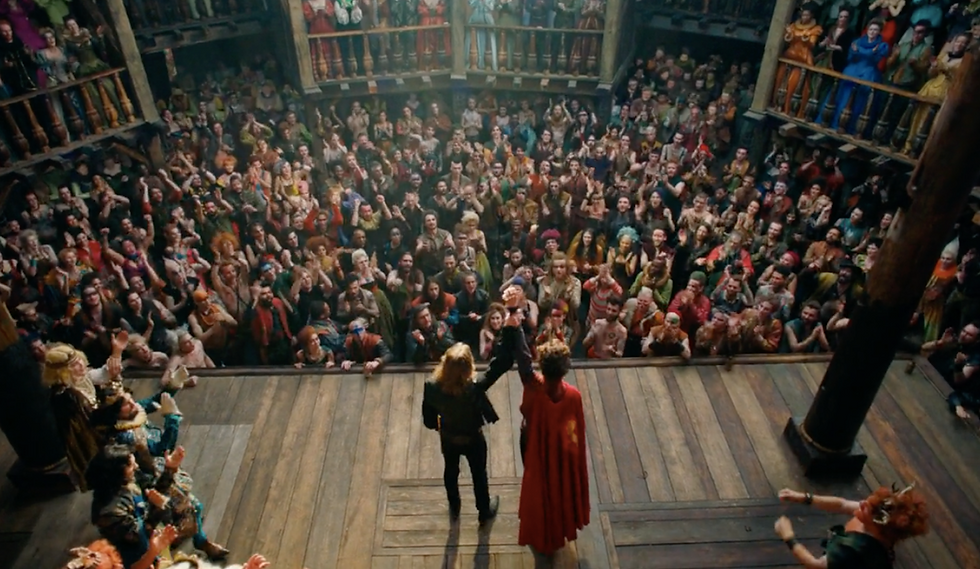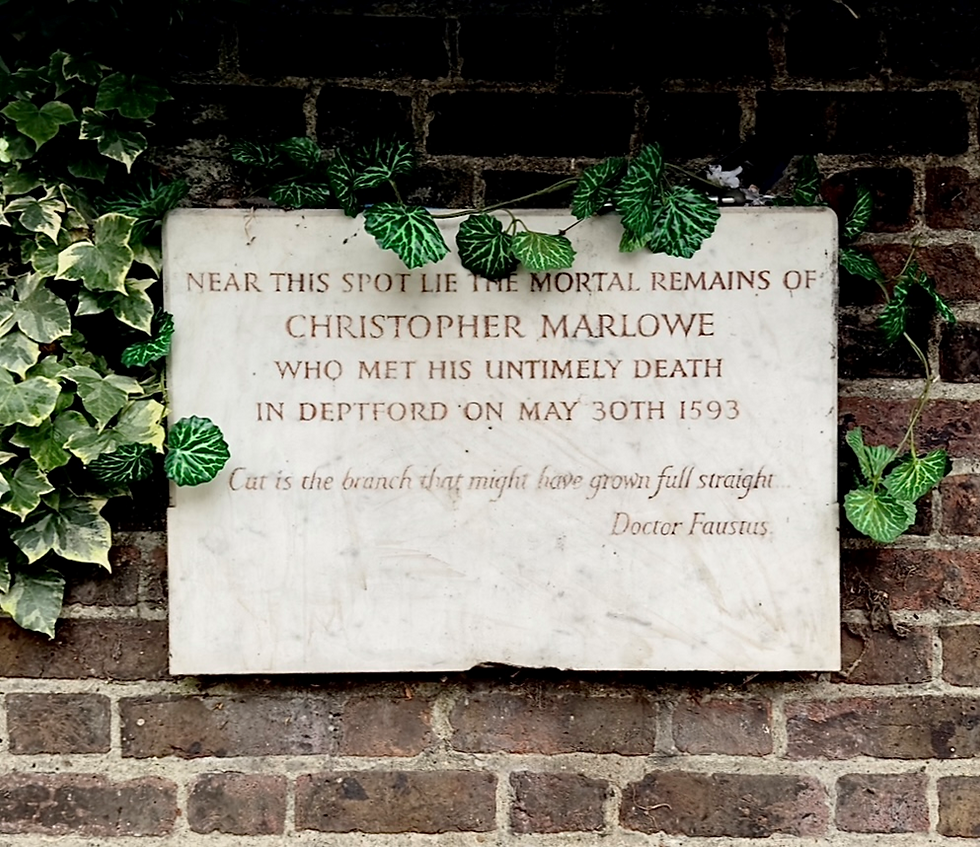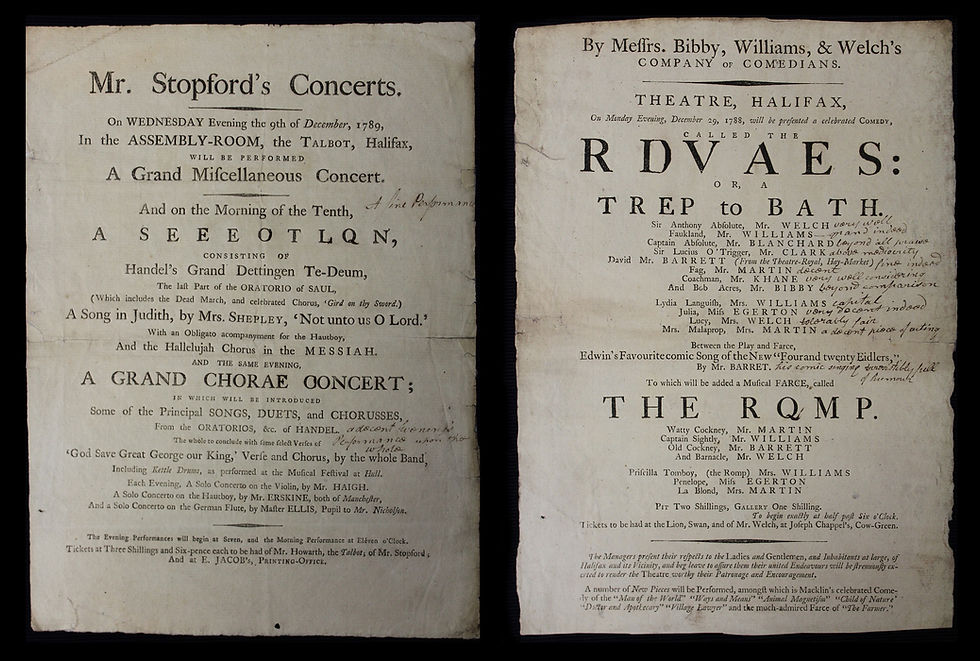Kind Kit? The Redemption of Christopher Marlowe in popular culture
- EPOCH

- Jun 1, 2023
- 8 min read
Angelina Andreeva | Lancaster University
Anyone who loves historical dramas or books has encountered the fictional Christopher Marlowe at least once - and there’s a high chance this encounter might have left them with mixed impressions or even unpleasant feelings. One of the most renowned poets and playwrights of the Elizabethan theatre has been a very attractive enigma for historians and media creators alike, and half the time the uncovering of this ‘enigma’ tends to take a pretty dark turn.
Marlowe was known as a talented poet and ‘rival of Shakespeare' who was notoriously murdered in a drunken tavern brawl. The idea of competition between the two literary giants understandably fascinates audiences and creators alike and has given rise to more captivating depictions of Shakespeare when in opposition to Marlowe. The details of Kit’s life have also influenced the way he was perceived throughout history. The possibility that he could have been a spy, the bold and in some cases even scandalous content of his plays, and the few powerful enemies in his surroundings, have led to a number of serious accusations he received throughout his life and after his death. That, along with his numerous trials and arrests, have led even historians and other scholars to make unfair judgments on his character, such as that he was ‘manically violent’ and ‘prone to wildly reckless speech’ as Jeffrey Meyers wrote in his Marlowe’s Lives.
This has taken its toll on the depictions of Marlowe in media. In worst cases, he is portrayed as a dark and selfish figure, like in 2011’s Anonymous: the fictional Marlowe is a talented poet and prolific spy who is obsessed with himself and would snitch on anyone for his own profit. In better depictions, as in 2016's Upstart Crow, he is portrayed as a friend to Shakespeare, as opposed to multiple portrayals of them being enemies or rivals, but even in these cases, he is a superficial opportunist, exploiting his friendship with the Bard.
However, the problem of Marlowe’s image has never been one-sided. There have been occasional sympathetic portrayals of the playwright in the past (in, for instance, Shakespeare in Love 1998) and especially in recent years, as media is turning to more nuanced and multifaceted depictions of Kit. One of the best examples of this phenomenon could be TNT’s Will (2017) where creators put a lot of effort into actually exploring Marlowe’s character, giving him a deep storyline and turning him into a show-stealer and an absolute rock star of the period. TNT’s Marlowe starts as the already familiar self-centred, cunning celebrity and spy who’s indulging in various condemned activities only to reveal that deep down he is vulnerable, kind, tormented about faith, and admirably loyal to his art, giving everything to produce another masterpiece of a play. The creators here took the various rumours that surrounded the real-life playwright and imbued them with a sense of doubt showing that these gossips might have had other, not so plain, origins. A similar story happens to the Marlowe of A Discovery of Witches— a trilogy and adapted TV series— in which he appears to be loving and caring, and his morally bad decisions are given at least some explanation.

This trend of re-imagining Marlowe in a more sympathetic light has not gone unnoticed amongst fans who start blogs exploring the playwright’s life. Equally, we have seen an increasing number of books with a deep, charming, and loyal Marlowe as a protagonist emerging in recent years— for instance, Alison Epstein’s A Tip for a Hangman; Alan Judd’s A Fine Madness, etc.

Our modern culture partially played its role in re-imagining Marlowe in fiction as now the rebellious and controversial topics he explored in his writings, his bold actions, and his alleged love for other men are seen as rather brave displays of character, considering the time Marlowe lived in. These became the reason for Marlowe to be celebrated now not only as a brilliant poet, but also as a queer icon, an intellectual doubting the doctrines accepted in his time, and someone who was cruelly and unfairly murdered. Marlowe's legacy has become a point of fascination for modern audiences, inspiring a renewed interest in his life and works.
But why does such a dichotomy exist? And what made the majority of people believe Marlowe was vile and arrogant? I argue that to paint him as a violent and unpredictable individual is pretty much unfounded. The problem of Marlowe’s controversial image is derived from deep-rooted prejudices that surrounded Kit during his lifetime and were supported for a long time after his death. I find his story to be overshadowed by misconceptions and untruths that stemmed from the lack of evidence or details about his life.
To illustrate that, let’s explore what’s actually known about Marlowe. The creators’ beloved topic of Marlowe-Shakespeare rivalry, while being good for the plots in most cases, creates a false impression that these two figures had to fight with each other for the spotlight when, in reality, Marlowe was Shakespeare’s predecessor in Elizabethan drama. Marlowe’s Tamburlaine was performed in 1587 for the first time which gave rise to his popularity, while Shakespeare’s plays were likely first staged around 1592, with his success rising after Kit’s death in 1593. Recent research also tells us that these two likely worked together on some of the plays, and Marlowe was the only other author that Shakespeare quoted twice in his works, which can testify to the respect he held for him.

And yet, it is the misconceptions about Marlowe’s death that affected his portrayals in fictional books and period dramas the most - even the ones where he is supposed to be an attractive protagonist with interesting character development, as in Anthony Burgess’s Deadman in Deptford. Burgess’s Marlowe isn’t one-sided and inherently bad, he’s intelligent and generous, but also lets himself be rude and harsh, makes business dealings while drunk or hungover, and isn’t a stranger to tavern fights.
The conviction that Marlowe frequented taverns started with Leslie Hotson, the first historian to shed some light on the playwright’s death by finding and translating the coroner’s inquest from Latin. Although pointing out the valuable source, Hotson didn’t analyse it, and its gaps, at all and rushed to hasty speculations arguing that ‘the men had been drinking deep; and the bitter debate over the score had roused Marlowe's intoxicated feelings’, supporting the claim that he was killed in self-defence. There is no reason, however, to state that Marlowe had ‘intoxicated feelings’ or he and his companions were abnormally drunk that day just because they met in a place where alcohol was available. Such public spaces as taverns, inns, parks, etc. were useful for the work of spies, as they proved to be not only a valuable source of information and rumours but also a crucial stage for schemes and plots. Such places were widely used by Francis Walsingham’s agents, whom Marlowe was rumoured to belong to. Moreover, Hotson was the first to label the place of Marlowe's death as a 'tavern,' a word that immediately evokes negative connotations and further tarnishes Marlowe's reputation. However, recent research into the spatial part of this case, including my own, has revealed that this house was not a random low-class tavern, but a rooming house conveniently located next to the Deptford port owned by a woman of substance, respected in her circles, and with strong connections to the court. This, combined with faults and gaps in the inquest and Marlowe’s suspicious and dangerous company on that day, suggests more sinister and tragic interpretations of his death than a misleading ‘tavern brawl’.
The evidence that can testify about Marlowe’s personality is clearer. To put it bluntly, there is none. It is true that Marlowe did have a dubious reputation and a smart mouth. However, without any speculation, it is probably the only thing that can be stated about his personality. There indeed were plenty of arrests and trials held against him, which can give an impression of Marlowe as a dangerous individual who flouted the law. However, the details paint a different picture. In 1589 he was arrested with another poet Thomas Watson when the latter killed William Bradley in self-defence. As it was later found out, Marlowe withdrew from the fight as it was Watson with whom Bradley had argued prior to that. In 1592 Kit was arrested in the Spanish Netherlands for counterfeiting Dutch shillings. However, Marlowe was there with two spies, one of whom, Richard Baines, accused him of counterfeiting. Considering that Baines had a well-documented history of animosity towards Marlowe and that he even urged the government to get rid of him for obscure reasons, his accusations are unlikely to have been a reliable source, and Marlowe was never found guilty. Later in 1592, the playwright was arrested when he allegedly assaulted William Corkyn in Canterbury. However, it was later discovered that Marlowe was actually the first to sue Corkyn for an assault. The most serious crime Marlowe was convicted of was the action of trover for not returning the horse that he hired from one James Wheatley. Under the circumstances of the case, the horse didn’t die in his possession - he just refused to give it back. He might have liked it too much.
It appears, however, that all the people who encountered Marlowe either loved or completely detested him. It is also noteworthy that all allegations regarding Marlowe’s ‘violent’, ‘wicked’ character are made by those who hated him for a variety of reasons: from jealousy of his talent and success to his supposed unconventional views. Marlowe’s purported atheistic claims and alleged involvement in Sir Walter Raleigh’s supposedly atheist circle made him an easy target for criticism after his death. The Puritan Thomas Beard was particularly harsh in his The Theatre of God's Judgements where he wrote that Marlowe had 'denied God and his son Christ […] but see what a hook the Lord put in the nostrils of this barking dog’. The writer William Vaughan shared the idea of using Marlowe’s death to celebrate God’s judgement writing about it ‘thus did God, the true executioner of divine justice, work the end of impious Atheists’. Gabriel Harvey, Marlowe’s contemporary and a scholar, mentioned Marlowe multiple times in his works along with some brutal comments regarding his immoral behaviour and audacity, and three months after Marlowe’s death Harvey called him Lucian, as a synonym for scoffer, and added that ‘Marlowe might admonish other to advise himself’. Fair to mention, that the latter was a Junior Proctor of the University at the time when the University Wits attended Cambridge, and the Wits, including Marlowe, had pretty tense relationships with him.
Despite being reviled by some, Marlowe was held in high regard among those who were close to him. A number of notable Elizabethan poets and Kit’s friends including George Peele, John Martson, and Ben Johnson lamented his death referring to him tenderly as ‘the Muses’ darling’, ‘kind Kit Marlowe’, and ‘poor deceased Kit Marlowe’. George Chapman remembered him as a ‘free soul’, and Michael Drayton spoke affectionately of Marlowe’s ‘fine madness’. Marlowe’s publisher, Edward Blount, when publishing Hero and Leander in 1598 dedicated it to Kit’s patron, Thomas Walsingham, one of those with whom Marlowe allegedly might have shared intimate relations. He wrote lovingly: ‘for albeit the eye there taketh his ever farewell of that beloved object, yet the impression of the man hath been dear unto us, living an after life in our memory’.

Kit Marlowe, without a doubt, is probably one of the best-studied historical figures about whom we still don’t know anything for certain. However, the tendency to remember or depict Marlowe as a dark, or arrogant figure, or as someone who would pick fights with drunkards, stems from the efforts of some of his contemporaries to use him to advance their ideology and from the misinterpretations of historical sources by early researchers. It is great to see that Marlowe has started to be explored in fiction and media and is getting more nuanced and multifaceted portrayals. Present-day creators find him to be an extremely interesting character on his own, and not only when opposed to Shakespeare. These fresh depictions of Marlowe got me stuck with him in my research for ages, and I believe that this newfound appreciation of his figure will inspire brilliant research in the future.
Further Reading:
Bossy, John, Under the Molehill: An Elizabethan Spy Story, (Yale University Press; 2001)
Kendall, Roy, Christopher Marlowe and Richard Baines: Journeys Through the Elizabethan Underground, (London, 2003)
Nicholl, Charles, The Reckoning: The murder of Christopher Marlowe, (London: Jonathan Cape, 1992)
Riggs, David, The World of Christopher Marlowe, (London: Faber & Faber, 2005)
Angelina Andreeva is a current History PhD researcher based at Lancaster University. She researches spatial history of early modern London, mapping Londoners’ diaries using GIS, and hopes to uncover contemporaries’ understandings and experiences of the city space. Her other research interests include the life of the Elizabethans, early modern espionage, theatre and literary history.

